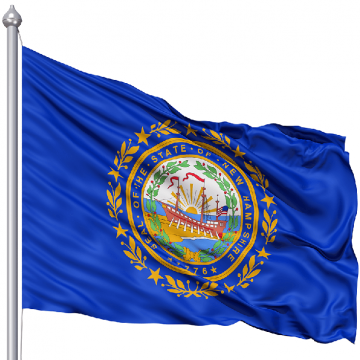
With several state legislatures looking to wrap up business for the year, many are looking to clear off old bills before a new session begins. In many states, that means they are looking at online gaming and poker legislation. In New Hampshire, that examination led to the passage of one form of gaming but not the entirety of the package.
The General Court of New Hampshire, in the waning moments of its 2017 legislative session, had a bill on the table for the regulation of online poker and casino gaming in the state. Called H562, the bill didn’t have much meat to the bones (it was basically a placeholder bill – one with no information but carving out a slot for the legislation to be input), but it would have provided for the regulation of the industry in the state. After some discussion, however, the Executive Session decided by a unanimous 23-0 vote to kill the bill, citing the reason of the bill being “inexpedient to legislate.” That essentially kills H562 for the remainder of 2017 and it will have to be reintroduced in 2018.
Instead of going ahead with full online casino gaming and poker, the General Court decided to move forward with online lottery sales in the state. The legislature enacted regulations regarding online lottery sales back in July with the plan to open for lottery sales at the start of 2018. With hope, the online lottery sales will demonstrate to those in Concord that online gaming is a viable income revenue for the state’s coffers.
There’s plenty of activity around New Hampshire that makes their reconsideration of online gaming and poker in 2018 almost guaranteed. Pennsylvania’s recent passage of online gaming regulations makes for four states in the States of America that have passed some form of online gaming and/or poker regulation (only Nevada has passed online poker only regulations). Along with New Jersey and Delaware, Nevada has compacted for shared liquidity (sharing player pools) and there is a school of thought that Pennsylvania will jump in with them once their industry is greenlit. There are also plenty of reasons to believe that Pennsylvania will want to see how their system fares before joining in with the “Original Three.”
Then there are the states that have “considering” written by their names, especially in the Northeast. Connecticut has been dallying with passing online gaming (right now they are settled on seeing how an expansion of live casino gaming is going to work out), but it is New York that seems to have the most momentum. After introducing legislation for the past three years, 2018 may be the year that New York – with New Jersey and Pennsylvania both passing legislation – will pull the trigger on their own online casino gaming and poker system. Add in West Virginia and Michigan and there’s plenty of players east of the Mississippi River that will have plenty of states thinking about their actions in 2018.
By passing online lottery sales, New Hampshire becomes only the fifth state to allow for such actions. The first state to pass online lottery sales regulations was Illinois, who was responsible for questioning the Department of Justice regarding the usage of the Wire Act of 1961. If you’ll recall that 2011 decision – which saw the Department of Justice state that the Wire Act only applied to sports betting – it was the decision from the federal government that opened the doors for the states to enact their own regulations regarding online gaming, poker, and lottery sales.
Immediately following that Christmas 2011 decision by the feds, Illinois became the first state to sell lottery tickets online in March 2012. Georgia quickly followed them later that same year and, in 2014, Michigan joined the party. The last state before New Hampshire to get into the online lottery ticket sales industry was Kentucky, who opened for online lottery ticket sales in April 2016.
The dominoes are beginning to fall regarding online gaming and poker, but they are falling extremely slowly. After Pennsylvania enters the game in 2018, if another larger state (such as New York or Michigan) was to enact their own legislation, then there might be movement from fringe states or possibly even the federal government. The feds movement, however, could go either way – passing some sort of national online gaming and poker regulations or banning it outright. Thus, it is critical that poker players keep a bit of attention on the different states and the federal government as online gaming and poker regulation moves forward.















